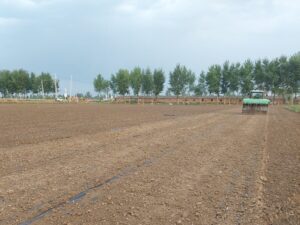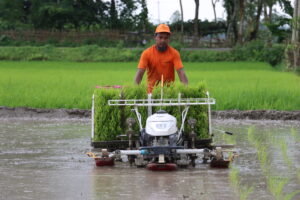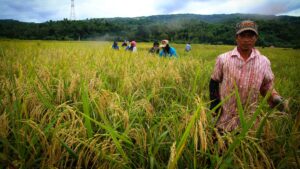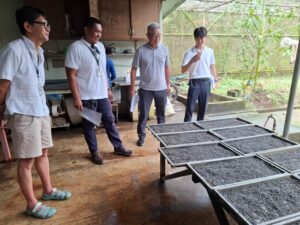By Bushra Humaira Sadaf, Abdullah Miajy, Abdul Haque, Sharif Ahmed, and Humnath Bhandari
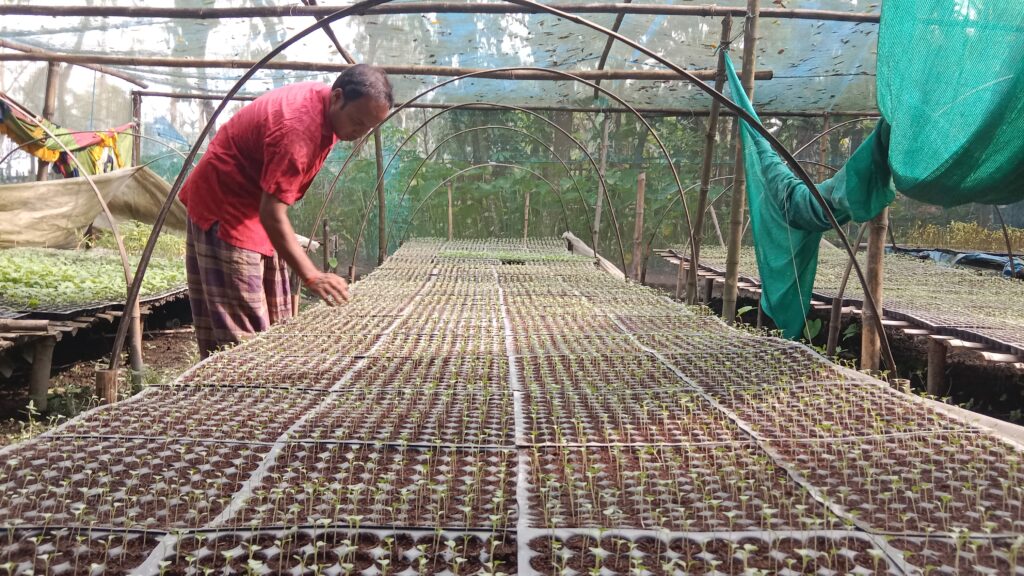
In rural Bangladesh, where most farmland is reserved for rice and cash crops, homestead gardening has become a way for families to get nutritious food and additional income. These small household plots, often managed by women, play a vital role in diversifying diets and strengthening food security, especially for land-poor communities.
Yet, year-round production has long been limited by one major challenge: access to quality seeds and seedlings. Locally developed nursery entrepreneurship is an excellent option for managing quality seeds/seedlings.
With the support by the CGIAR Initiative for Sustainable Farming Systems, IRRI has trained seventeen young individuals, included two females and fifteen males, from Rangpur, Nilphamari, and Dinajpur districts through a nursery entrepreneurship training at the Horticulture Centre in Rangpur.
The training covered commercial nursery design and management, selection of suitable vegetable and fruit varieties for seedling production, pest and disease management, and marketing strategies. Following the training, the participants established their own nurseries in their respective areas. Since then, they have grown and sold vegetable and fruit seedlings to neighboring farmers with support from IRRI and DAE. Local farmers are highly satisfied with the quality of seedlings and saplings provided by these nursery entrepreneurs, as the supply meets their demand effectively.
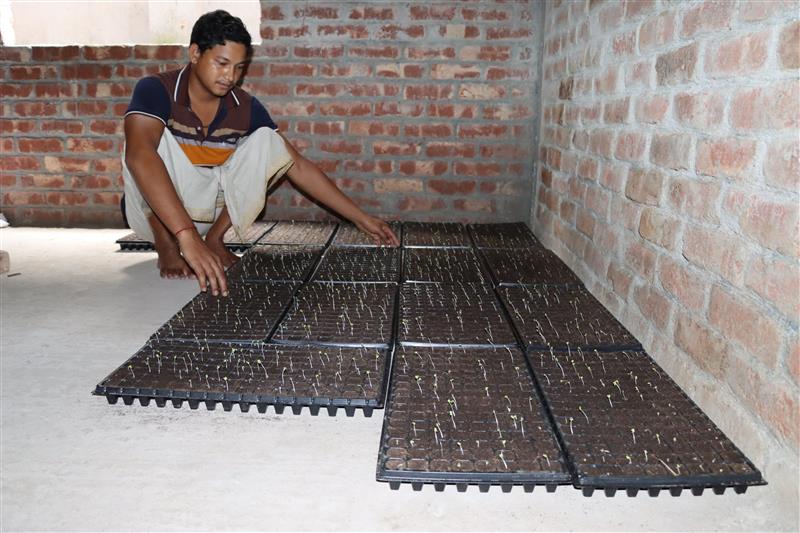
Sucess stories
Mizanur Rahman, 38, from Gardharmapal in Nilphamari, used to be unemployed. His family of four lived off the little income they made from cultivating 80 decimals of land. But unpredictable weather, high input costs, and poor market access kept him in poverty. “I had no job, and no hope. Now I run my own nursery and support my family.”
His situation gradually changed when he attended nursery entrepreneurship training. With basic tools, technical support, and two decimals of unused government land, he began producing vegetable seedlings.
That same season, he earned BDT 15,000 by selling brinjal, chili, cabbage, and tomato seedlings. A few months later, he grew 4,000 pieces of gourd seedlings and sold each at BDT 12—making BDT 48,000 in two months.
“I started with nothing. Now I’ve expanded my nursery to five decimals and supply seedlings to farmers in nearby villages,” said Mizanur. “I’ve even been able to invest back into my land and family.”
Another farmer Dilip Chandra Roy, nursery farming was not new, but success came only after failure. He started a nursery in 2022 but didn’t have proper training. Without quality seeds or proper pest management, he couldn’t sell much and had to shut it down.
“I almost gave up when I started the nursery because I was not making enough money and did not know a lot of things,” said Dilip. “I spent a lot of money yet failed in most cases” But in 2024, he joined a training program organized by CGIAR’s Mixed Farming Systems (MFS) and BARI’s Horticulture Centre in Rangpur, where he learned modern nursery techniques like seedling trays, soil media preparation, grafting, seasonal planning, and more.
He restarted with five decimals of land and produced over 100,000 seedlings. Last Rabi season, he made a net profit of BDT 170,000. “Now, I’m confident. I’m growing even more varieties this season.”
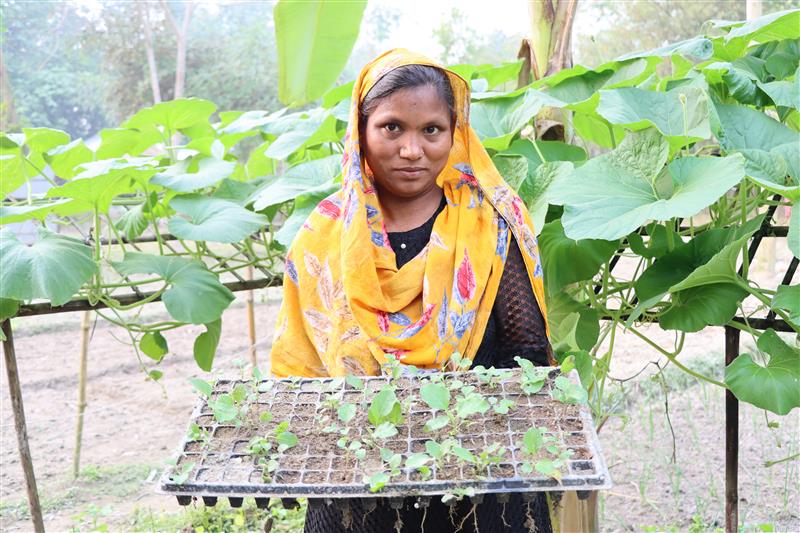
Among the 17 entrepreneurs, women are leveraging nursery businesses to achieve financial independence and demonstrate leadership within their communities.
One of them, Marium Begum from Ishwarpur, started with only three decimals of land. She has already earned BDT 12,000 selling vegetable seedlings to local farmers. Her success is motivating other women to take part in homestead gardening, strengthening nutrition while creating new income streams for rural households.
A small business with big potential and fast profit
Nursery entrepreneurship requires a relatively low start-up investment of BDT 30,000 to 50,000, and most entrepreneurs recover their costs within 6 to 12 months. With profits ranging from 30–40%, this model offers a sustainable and climate-resilient livelihood option for vulnerable households. Beyond individual incomes, the impact extends across entire communities. Local food systems are strengthened as farmers gain timely access to high-quality seedlings. Crop diversification reduces climate vulnerability, while new livelihood opportunities, especially for women and youth, help build financial independence. Homestead gardening supported by these nurseries improves household nutrition, and together, these outcomes contribute to greater resilience in a region increasingly challenged by climate risks.
The shift to nursery entrepreneurship is just boosting incomes and it’s making local farming more resilient. Farmers can now access quality seedlings on time, at lower prices, without traveling far. As more farmers look for low-risk, high-return alternatives to traditional farming, nursery entrepreneurship is helping them grow more crops, and it’s helping them grow a future.
The CGIAR initiative on Mixed Farming Systems (MFS) was implemented in Bangladesh from 2022 to 2024. Building on this innovation, the MFS approach has been integrated into CGIAR’s new science program, “Sustainable Farming,” to further promote sustainable agricultural practices.

